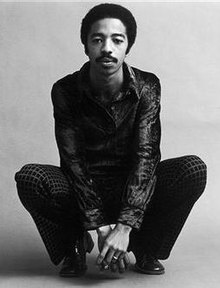Tony Williams (drummer)
| Tony Williams | |
|---|---|
 |
|
| Background information | |
| Birth name | Anthony Tillmon Williams |
| Born |
December 12, 1945 Chicago, Illinois, US |
| Origin | Boston, Massachusetts, US |
| Died | February 23, 1997 (aged 51) Daly City, California, US |
| Genres | Jazz, post-bop, jazz fusion |
| Occupation(s) | Musician, composer, producer and bandleader |
| Instruments | Drums |
| Years active | 1961–1997 |
| Associated acts | Miles Davis, The Tony Williams Lifetime, Sam Rivers, Jackie McLean, Alan Dawson, V.S.O.P., Public Image Ltd. |
Anthony Tillmon "Tony" Williams (December 12, 1945 – February 23, 1997) was an American jazz drummer.
Widely regarded as one of the most important and influential jazz drummers in history, Williams first gained fame in the band of trumpeter Miles Davis and was a pioneer of jazz fusion. He was inducted into the Modern Drummer Hall of Fame in 1986.
Williams was born in Chicago and grew up in Boston. He was of African, Portuguese, and Chinese descent. He studied with drummer Alan Dawson at an early age, and began playing professionally at the age of 13 with saxophonist Sam Rivers. Saxophonist Jackie McLean hired Williams when he was 16.
At 17 Williams found considerable fame with Miles Davis, joining a group that was later dubbed Davis's Second Great Quintet. Williams was a vital element of the group, called by Davis in his autobiography "the center that the group's sound revolved around." His inventive playing helped redefine the role of the jazz rhythm section through the use of polyrhythms and metric modulation, moving between mathematically related tempos and/or time signatures.
Williams was an integral participant in the early- to mid-1960s avant-garde movement, playing on such classics as Jackie McLean's One Step Beyond, Grachan Moncur III's Evolution and Some Other Stuff, Sam Rivers's Fuchsia Swing Song, Andrew Hill's Point of Departure, and Eric Dolphy's Out to Lunch. His first album as a leader, 1964's Life Time, was also in the avant-garde vein.
...
Wikipedia
